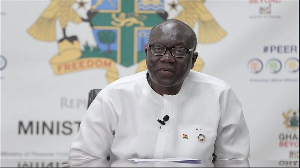The General Agricultural Workers' Union (GAWU) in collaboration with Action aid Ghana on Wednesday organised a National Forum on Climate Resilient Sustainable Agriculture (CRSA) for stakeholders.
The forum was to assess government's commitment to investment in CRSA interventions at the district, regional and national levels and to provide local level evidence from CRSA demonstration farms, of the viability and sustainability of this system.
Mr Delali Nutsukpo, of the Ministry of Agriculture said the vulnerability of Ghanaian agriculture and food systems to Climate Change (CC) is not in dispute, as a vulnerability assessment carried out in 2008 by Economic Partnership Agreement (EPA) clearly establishes the scope of vulnerability, supported by predictions based on studies locally and internationally.
He said future predictions include increases in temperatures by about 1.5oC (Menia et al) and increasing rainfall variability under various scenarios.
He said earlier actions by Ghana to the predictions were in line with global response, including mitigation actions mostly in transport, energy and forestry sectors.
“Initial response of government of Ghana aimed at adaptation was the National Climate Change and Adaptation Strategy, which covered 10 programme areas and the implementation, was mainstreamed into various sector policies and plans.
Government earlier also introduced two major interventions led by EPA namely Integrated Dryland Development Project and Ghana Environmental Management Project, implemented in selected districts in the three northern regions, and have contributed immensely to improving rural livelihoods and building environmental resilience.
He said additional to the two projects was the Sustainable Land and Water Management Project, which focused on improving land productivity and enhancement of household incomes, improved farmer productivity and production, diversified income sources improved environmental quality.
Mr Nutsukpo said a major Government response to climate change challenge found in the Ghana Shared Growth and Development Agenda, recognises CC as a major threat to Ghana’s development hence the need for action
He said the development of a policy framework with three major Pillars, including effective adaptation, social development and low carbon development, as well as a national CC Policy with strategies for five priority areas including agriculture and food security, was very paramount.
“The Ghana Agriculture Services Sector Investment Project is a new project that aims at supporting small and medium scale agriculture entrepreneurs along the value chain, and hopes to mainstream CSA by ensuring that all approved and funded business proposals are climate responsive. Additionally there is a special 10- million dollar CC fund to address impacts in the three northern regions,” he noted.
He said the FAO, UNDP, WP, and the UN University is Collaborating with the Government to implement the resilient landscape and sustainable livelihoods project, to build the resilience of farming communities against present and future climatic change effects.
Mr Nutsukpo said the project would use the development of value chains as it entry point to increase productivity and incomes of farmers, adding that the FAO is currently supporting the Government to build capacity for developing CSA investment packages at all levels.
He said Government recognises the threats posed to development by CC effects and as such, most of government led projects have broad development objectives to address climatic change.
He however noted that a number of projects and interventions are also being implemented by different stakeholders to address the issue.
Mr Kingsley Ofei-Nkansah, General Secretary, GAWU said climate change and its effects lead to loss of jobs, decreased agricultural productivity, and general GDP in an economy.
He said the effects of climate change threaten food security, food sovereignty and the right to food, adding that, it threatens the livelihood of women and children.
Mr Kingsley Ofei-Nkansah said there is the need for a strong call for public sector investment in smallholder agriculture and the adoption of climate resilient strategies by farmers in order to withstand the vagaries of climate change.
He said GAWU and all trade unions are concerned about climate change from a stand point, and agricultural trade unions like GAWU have even more interest in working on climate change because agriculture is an extremely climate sensitive economic activity.
Regional News of Thursday, 12 May 2016
Source: GNA












